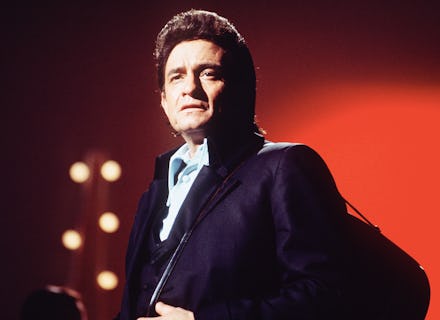Scientists Accidentally Turned a Man Into a Johnny Cash Fan With a Brain Implant

Whether it's a tendency to write Moby Dick-length works of fan fiction starring the Backstreet Boys or simply loving a piece of music so deeply that you listen to it on repeat, everyone can relate to being a die-hard fan. And this month, scientists unearthed a case that gives a strange explanation of extreme fandom: Being a fan of certain kinds of music actually has a very clear physiological root in the brain.
Pop culture is riddled with colorful examples of people who shape their lives and identities around their infatuation with stars. Take Paul McLeod, whose 50-year-long obsession with Elvis Presley has led him to turn his home into a giant, pink shrine that he calls "Graceland Too," after Elvis' ranch-turned-mecca, Graceland. It all started after he saw Elvis perform on his birthday in 1954. After that, he saw Elvis play another 119 times.
Image Credit: Flickr Creative Commons/Diana Gurley McGaw
Similarly, Chris Crocker became a YouTube celebrity after his passionate "Leave Britney Alone!" video was viewed 50 million times. A middle-aged man named Carl McCoid found Miley Cyrus during a difficult divorce and then had her likeness tattooed all over his body 25 times.
But the experience of Johnny Cash fan "Mr. B" is perhaps the most unique. This month, three Dutch researchers published an article in the journal Frontiers in Behavioral Neuroscience about a Dutch man named Mr. B who suffered from an acute case of OCD and anxiety. The severity of his condition led him to attempt treatment through deep brain stimulation. During this procedure, electrodes are implanted in the nucleus accumbens, the region of the brain that processes pleasure and motivation. The area is stimulated with the hopes of counteracting abnormal electrical and chemical patterns associated with mental illness. The surgery was very successful, but had one unintended side effect: Mr. B became a passionate Johnny Cash fan. This was the story recounted in the scientific article, "A Case of Musical Preference for Johnny Cash following Deep Brain Stimulation of the Nucleus Accumbens."
After getting the treatment, Mr. B.'s anxiety and OCD reduced dramatically. He became confident and self-assured. But when he checked in six months after the surgery, he reported something new. One day, when he was listening to the radio, he heard Cash's "Ring of Fire." He was — seemingly out of nowhere — transfixed by Cash's voice. Quickly, his love for the song became an obsession with Cash, especially songs from the '70s and '80s when the singer's voice was deepest. He stopped listening to anything else for months.
"From this moment on, Mr. B. kept listening simply and solely to Johnny Cash and bought all his CDs and DVDs," the researchers reported. "From the first time Mr. B. heard a Johnny Cash song, [all other music] has been banned."
At first, it seems coincidental. But a correlation soon emerged between Mr. B's treatment and his fandom: When the batteries in Mr. B's implant began to fade, so, too, did his love of Cash. He would listen to other music, whereas before he'd listen only to the Man in Black. His fixation was firmly, locally rooted in his brain.
Intense fandom comes from all sorts of places, but Mr. B's case offers a rare insight into why exactly obsession with an artist is such a deep, powerful feeling. We all go through phases of fixation with songs or artists, where we see the world through their lyrics and pitches. We might go through life without getting Miley tattoos, but even when you find yourself hitting replay again and again, it's comforting, in some sense, to know that to feel so close to an artist is, in some way, to let them become a part of you.